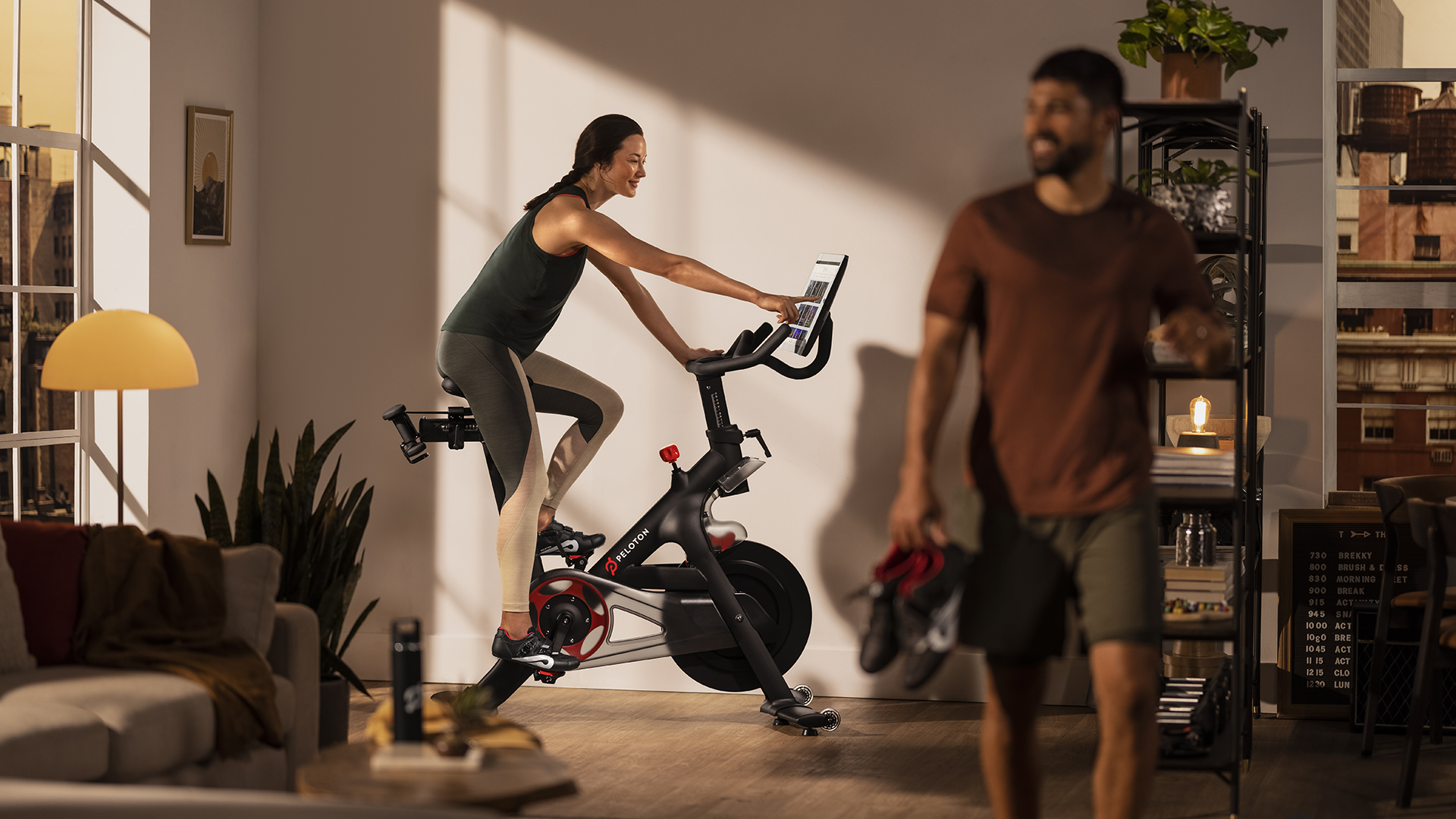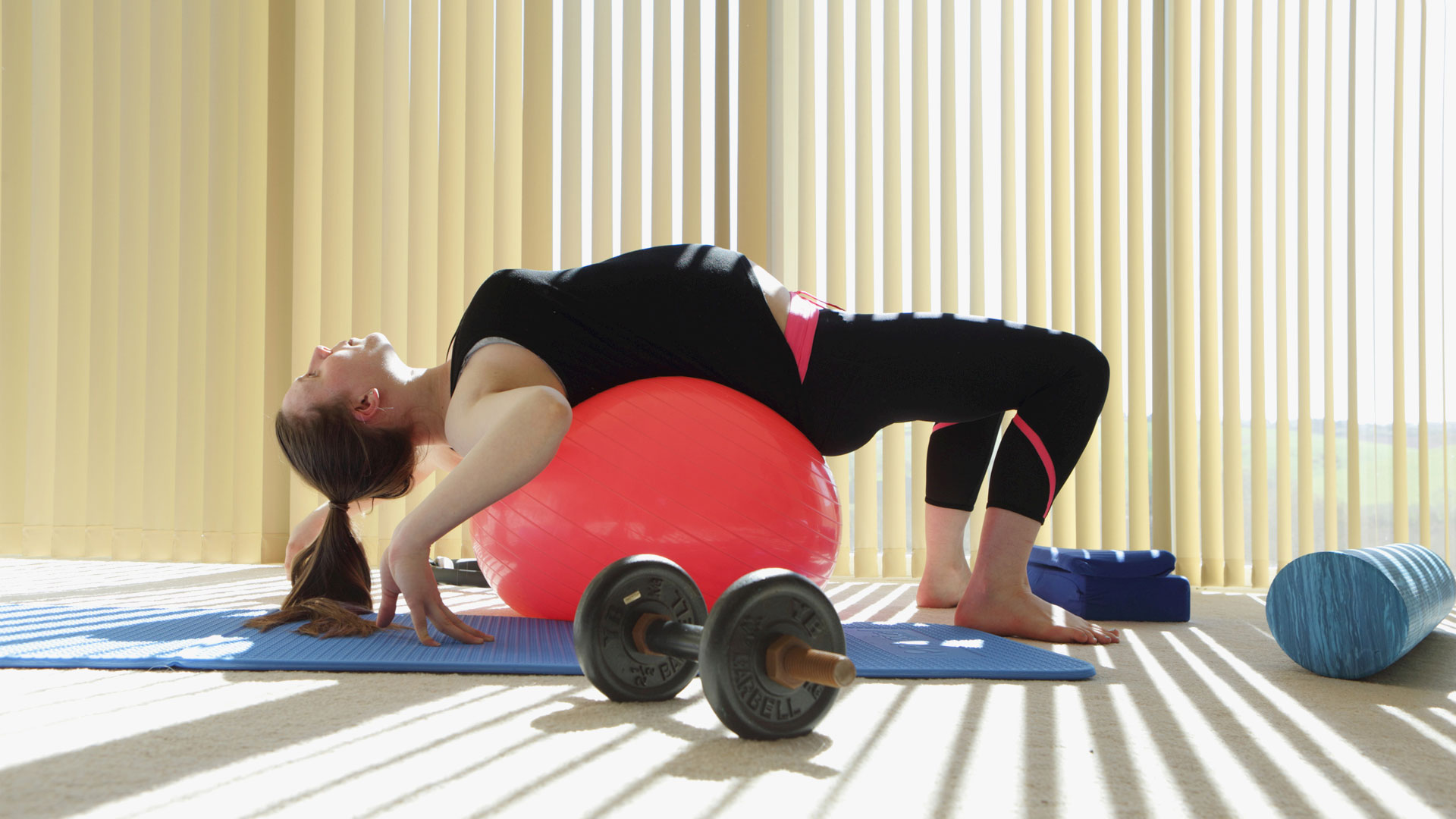Can you use a Peloton when pregnant?
A Peloton provides a great all-around workout – but can you use a Peloton when pregnant?

It's one of the most popular fitness machines around, but can you use a Peloton when pregnant? Even though women are encouraged to keep fit during pregnancy, it’s completely normal to feel cautious about the workouts you choose. Whether or not you were a fan of indoor cycling pre-pregnancy, exercising regularly when you’re expecting offers an array of health benefits for both mother and baby. See if you can secure a Peloton for a discounted price with our Peloton deals and discount codes page.
So, can you use a Peloton when pregnant? One of the most popular exercise bikes to get your home-cardio hit, the Peloton is a fantastic way to keep your physical and mental health in check and maintain your range of flexibility. It can also prepare you for labor and help you get back into shape after birth. But it’s still important to exercise with care over the nine months as your body physically transforms – with increasingly looser ligaments, a shift in your center of gravity, weight gain and respiratory and metabolic changes to consider. You can have a look at our buying guide for the best exercise bikes to see what's available at the moment.
Here we talk to Leanne O'Brien, Consultant Women's Health Physio at Six Physio, about the benefits of exercising during pregnancy and whether the Peloton is a good workout choice for pregnant women.
And even if you aren't pregnant, an exercise bike or similar fitness machine such as a treadmill like the Peloton Tread or rowing machine can be a great investment. Be sure to check out our useful comparison of Peloton vs Echelon for more, as well as our guide to the best shoes for Peloton.
Can you work out when pregnant?
One of the most divisive questions amongst moms-to-be is whether it’s safe to exercise while pregnant. "Yes, you can definitely exercise during pregnancy. But you may need to modify your existing exercise plan depending on the type of exercise you like to do," O'Brien told Live Science. "For example, contact sports and hot yoga should be avoided and intense interval training may need to be reduced. However, this will depend on how you’re feeling during your pregnancy and how your pregnancy is progressing."

In fact, the American College of Obstetricians and Gynaecologists (ACOG) says that it’s safe for you to continue or start physical activity while pregnant, under the guidance of your healthcare professional. They recommend that women with uncomplicated pregnancies should get at least 150 minutes of moderate-intensity aerobic and strength-conditioning activities each week.
"If you have a high-risk pregnancy you should always check with your obstetrician or midwife before exercising. For example, women with pre-eclampsia or a very low-lying placenta are often advised to refrain completely from exercising. Women with a previous history of miscarriage may want to reduce their activity levels in the first trimester," explained O'Brien. And according to the Mayo Clinic, your healthcare provider may advise you not to exercise if you have severe anemia, are pregnant with twins or triplets at risk of preterm labor, your water has broken or you’ve had preterm labor during this pregnancy.
Can you use a Peloton when pregnant?
Using a Peloton is a great way to maintain cardiovascular fitness and muscular endurance during pregnancy, said O'Brien. Plus, you can control the intensity and length of your ride.
Peloton has even launched a prenatal collection, which includes strength training classes and a recovery ride. And Peloton instructor, and VP of programming, Robin Arzón showed no signs of slowing down when she continued teaching classes during her pregnancy, right up to her due date (remember that everyone's different, though, so you should listen to your body and consult your doctor if you're in any doubt about how much exercise to do).
"You can also use Peloton's prenatal strength workouts, which incorporate functional strengthening for your arms, legs and core. A good prenatal exercise plan should always include both cardiovascular and strengthening exercises," explained O'Brien.
Using a Peloton can also help prepare you for the birth of your baby. O’Brien said: "You need good muscular strength and endurance to deliver your baby. Childbirth can be a long process, so muscular endurance is essential to ensure you’re able to push effectively over some time."
And if you love cycling, the Peloton bike is also a much safer option compared to using a road bike outdoors. "Your base of support is constantly changing during pregnancy, which can reduce your balance and increase your risk of falling off," said O’Brien. One study in the American Journal of Obstetrics & Gynecology found that stationary cycling was found to be safe and beneficial after being extensively studied.
How important is keeping fit during pregnancy?
Although you may feel like pregnancy is the time to relax and put your feet up, staying active during your pregnancy is essential in maintaining your fitness levels for the health of your baby and yourself. According to the ACOG, regular exercise can ease constipation, reduce back pain, strengthen your heart and blood vessels, promote healthy weight gain and improve your overall fitness.

"Research shows that mothers who are physically active during their pregnancy are less likely to develop gestational diabetes, pre-eclampsia, pelvic girdle pain and postnatal depression. It can also reduce the likelihood of you requiring a C-section. Engaging in regular exercise during pregnancy can also reduce your baby’s risk of developing cardiovascular disease, obesity and diabetes in later life," explained O'Brien.
What’s more, exercise boosts the production of your brain’s feel-good neurotransmitters, called endorphins. One study in the Journal of Sports Medicine and Physical Fitness found that one single workout boosted the mood of pregnant women.
There are many more home workout ideas at Live Science to inspire you.
How to exercise safely with a Peloton during pregnancy
If you’re using a Peloton during pregnancy, here are some tips to ensure you have a safe ride:
1. Stay hydrated and cool
Drink plenty of water during and after your workout, so you don’t become dehydrated. Pregnant women need more water than the average person, plus if you’re not drinking enough there’s a risk you'll overheat. And opt for clothes that are lightweight and breathable with a sports bra that offers plenty of support.
2. Listen to your body
"You should consistently monitor how your body is feeling when you exercise," said O'Brien. "During pregnancy, your body produces a hormone called relaxin that encourages the ligaments around your pelvis to slacken slightly. This means that you need to be slightly more cautious with stretching and jumping-based exercises. These exercises are perfectly safe to complete, but make sure you're monitoring how your body feels to ensure you don't overstretch and cause pain."
Exercise should always be pain free and if you feel dizzy, light headed or faint when exercising, stop immediately. Always consult your midwife or obstetrician if your symptoms persist.
3. Adjust your bike set-up
As your body changes through your nine-month stretch, modify your bike set-up to accommodate your growing bump. Raise the handlebars and adjust the saddle position. It may be more suitable to sit more upright to avoid lower-back strain when you lean forward.
4. Monitor intensity levels during the workouts
If you weren’t physically active before pregnancy, take your time and do exercises that build up gradually. If at any time you don’t feel well while you’re riding, take a break or lower the intensity of your workout.
The ACOG recommends using the talk test when exercising during pregnancy. If you can still maintain a conversation during exercise without gasping for breath, you are most probably working at a suitable intensity. If you can only say a few words between breaths, ease off a bit.
Sign up for the Live Science daily newsletter now
Get the world’s most fascinating discoveries delivered straight to your inbox.
Karen Gordon is a freelance writer and web content editor with a special interest in health, and is based in the United Kingdom, As well as contributing to Live Science Karen has written for a variety of other publications, including NetDoctor, Patient.co.uk, Good Housekeeping, Prima, Cosmopolitan, Harper’s Bazaar and others.











